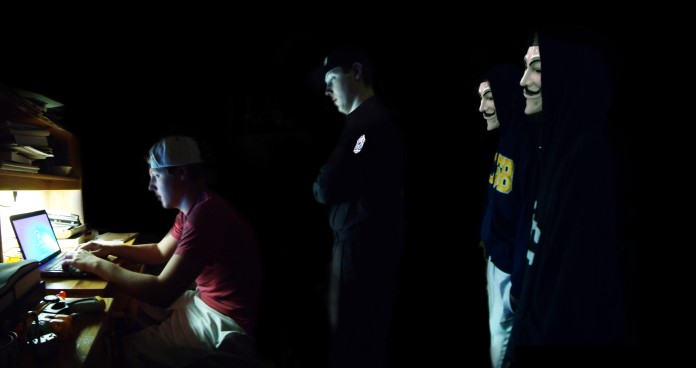Writer
In the wake of the Jan. 18 SOPA/PIPA blackout of popular sites like Wikipedia and Reddit.com, the Jan. 19 government take-down of popular file-sharing website MegaUpload, whose owners have been accused of copyright infringement, came as a shock.
At a time when many college students and young professionals struggle to make ends meet, media and entertainment are taking on new roles and forms. As the next generation of consumers, college students’ habits are becoming more important to growing companies.
Many young Internet users are calling for new types of customer service, and in a post-needs age of cloud storage and instant access to information, many forms of entertainment are becoming outdated. Cable subscriptions and theater-going are two examples for which the customer base is declining, particularly when 8.5 percent of the labor force is unemployed and many more are underemployed or in debt. Instant accessibility and availability of options for a reasonable price are what customers demand.
I’ve personally used MegaUpload for file-sharing both non-copyrighted foreign shows and .pdf or .ebook documents that were not available for sale elsewhere. A few times I acquired .mp3 files for orchestra pieces I would learn from my directors and teaching assistants. And while sites like Google Docs and Dropbox have supplanted MegaUpload for this sort of file-sharing, pirating websites like ThePirateBay.org are becoming more and more popular. Some argue that the motivation for pirating is an economic one, and it’s not unreasonable to believe that people download thousands of songs or shows because it’s free and they can. On the other hand, it’s certainly possible for companies to profit by charging for the services and shows they provide in a way that discourages pirated products.
MegaUpload itself has been long outdated in the era of Netflix, Hulu and other sites that allow legal streaming of videos without long download times. For many users, however, the service is lacking.
“I don’t mind Hulu’s commercials because I can ignore them so easily, but I really prefer Netflix,” fourth-year anthropology major Annika Kinsman says. “I dislike that Hulu has a lot of ‘Hulu Plus’ BS now and I can’t watch past the first little ninety-second teaser.”
Another complaint is that streaming services are limited to certain shows.
“For Netflix, most shows I watch are on it so I don’t complain much about it except when they’re DVD only,” says third-year Japanese major Rhena Aricheta.
For many college students who may not have DVD drives or reliable mailboxes, this can be a frustrating inconvenience.
Since the 2008 recession, Friday night at the movies with crying babies and overpriced snacks has become a so-called “premium” service. Viewers prefer the comfort of their living room or the convenience of their headphones, so paying more to enjoy less is no longer an adequate business model. Theater ticket prices at the Regal Entertainment Group, the nation’s largest theater chain, have outpaced inflation by more than half since 1999, Michael Cieply at the New York Times writes.
“Theater attendance has fallen by about 10 percent in that period, or even more when measured as a share of the growing population.”
And while theater owners may lament this drop in business, it demonstrates a time of change, when the industry will need to learn to exceed customer demand for new kinds of service.
Companies like Amazon and Apple have overwhelmingly succeeded in the wake of the dot-com bubble of the late 1990s and the recession of the last four years due to their flexible business strategies, putting the mind of the customer before traditions and customs. Bloomberg Businessweek’s Mark W. Johnson writes: “Amazon survived the dot-com bust because it had a viable and innovative business model built around a market-changing customer value proposition and a radical profit formula, which upended the staid book industry,” referring to Amazon’s revolutionary Kindle e-reader and its competitors. Amazon’s database of customer reviews have also changed the shopping experience for many people investing in things like cameras, televisions, and computers. Now customers can read about hundreds of experiences with a specific product before deciding to purchase, and these same customers are becoming accustomed to expecting better products in the process.
The entertainment industry may go through a similar change in customer experience in the next few years, more so than it has already with online streaming. Rather than paying for 500 channels and watching only five shows a week, customers may be able to buy an episode or a season of a show and watch it on any number of devices. With iTunes and Amazon video services this is already a reality, but as more people cancel their cable subscriptions they will want instant access to new episodes, instead of the current eight-to-ten day wait with services like Hulu. The prices may also drop due to more people making these purchases, and due to streamlining in other parts of the entertainment production process.
International customers should be taken into consideration as well, and this was one of the bigger complaints about SOPA and PIPA, which would shut down American sites accused (but not proved) of copyright infringement even if it affected international users. The shrunken world of the Internet age demands worldwide access to the same shows and movies.
During my time abroad in France, I was disappointed to learn that my Netflix subscription would not work with a French IP address. For my friends and me, this complete isolation from American television made the culture shock that much more difficult to deal with. Opening up copyright laws to allow for international business can only help the industry at this point, because for now the only option for watching some shows is to pirate them.
This exciting time of cloud technology and touch-screens demands new business models from the entertainment industry, and instant, universal access to shows and movies might be what gives the industry and the economy a much-needed boost.












Comments are closed.